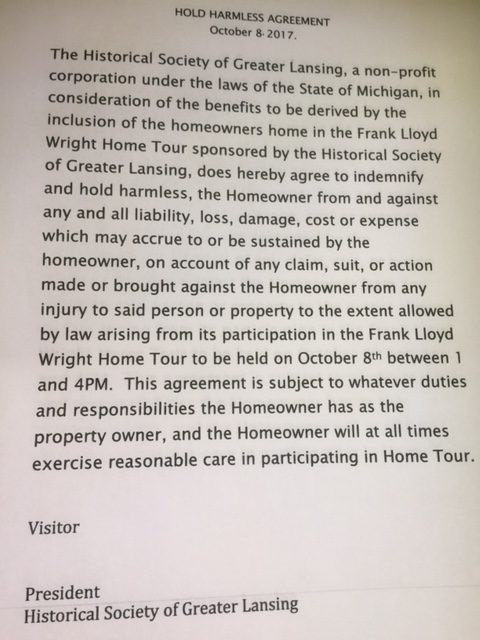Today Joe Kimble, doyen of the legal-writing community, sent me the following photo of a contract he had been asked to sign.
 The issue wasn’t the wall-to-wall legalese. Instead, in his email Joe said, “I signed this for a home tour yesterday. Why would visitors be asked to sign when the agreement is between the Lansing Historical Society and the homeowners?”
The issue wasn’t the wall-to-wall legalese. Instead, in his email Joe said, “I signed this for a home tour yesterday. Why would visitors be asked to sign when the agreement is between the Lansing Historical Society and the homeowners?”
That’s a good question to which I have no answer. But it allows me to know ask you, dear reader, to offer any examples you’ve encountered of the wrong person being made party to a contract. I suspect there are plenty of examples of an affiliate inappropriately being made party to a contract, but I’m hoping for some goofier stuff.

I frequently see the mistake that a contract is in one person’s name and the text of the contract has provisions that purport to create obligations binding on persons who are not party to the agreement (i.e. shareholders, parent, subsidiary or sister corporations). There is a line of Supreme Court of Canada cases in Canada that allows non-parties to rely on contractual provisions (typically to allow non-parties to rely on release language) but its application is pretty narrow. However, I haven’t seen this extended to allow obligations to be imposed on non-parties – just and extension of benefits to non-parties. London Drugs Ltd. v. Kuehne
& Nagel International Ltd. (1992); Edgeworth Construction Ltd. v.
N.E. Lea & Associates (1993); Fraser River Pile & Dredge Ltd. v.
Can-Dive Services Ltd(1999)